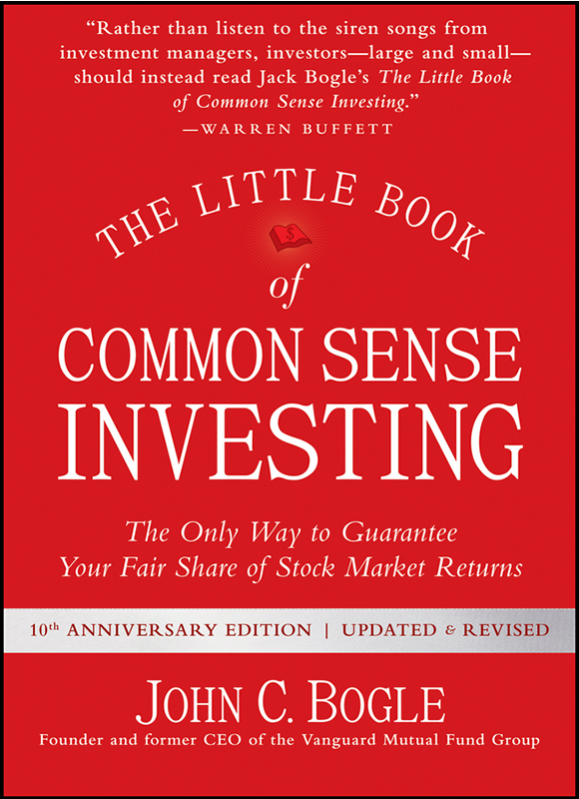
The simplest way to own the stock market is to hold the classic S&P 500 Index fund. But I now recommend a total stock market index fund that includes virtually every stock in the U.S. market. Why? Because it eliminates the risk that the S&P 500—largely composed of giant companies—will falter, while smaller- and mid-sized stocks thrive.
“The Little Book of Common Sense Investing” is John C. Bogle’s powerful manifesto on the superiority of index fund investing. As the founder of Vanguard Group and creator of the world’s first index mutual fund, Bogle draws on his decades of experience to present a straightforward strategy that can outperform the vast majority of actively managed mutual funds over the long term.
The central thesis of the book is disarmingly simple: instead of trying to beat the market (which is a loser’s game for the average investor), investors should simply own the entire market through low-cost index funds. Bogle methodically dismantles the investment industry’s claims that professional money managers can consistently outperform the market after costs. He presents compelling evidence showing that after accounting for management fees, trading costs, and tax inefficiencies, the vast majority of actively managed funds underperform their benchmark indices.
Bogle explains that the mathematics of investing is elementary, investors as a group must earn the market’s return before costs. Since active investing is a zero-sum game (for every winner, there must be a loser), and since investors must pay significant costs for active management, active investing becomes a negative-sum game after costs. Meanwhile, index investing allows investors to capture nearly the entire market return with minimal costs.
The book is structured to systematically dismantle common objections to index investing. Bogle addresses concerns about market timing, stock picking, smart beta strategies, and other investment approaches that promise superior returns. He demonstrates through historical data and logical arguments why these approaches are unlikely to succeed for the average investor.
Bogle doesn’t just focus on the mechanics of investing; he also addresses the emotional and psychological aspects. He discusses the importance of long-term thinking, the folly of performance chasing, and how investors often harm themselves by buying high and selling low. He advocates for a disciplined, patient approach that ignores short-term market fluctuations and focuses instead on the compounding of returns over decades.
What makes Bogle’s argument particularly compelling is his moral dimension. He points out the inherent conflict of interest in the financial industry, where firms are incentivized to maximize their own profits rather than investor returns. He contrasts this with his vision of “fiduciary capitalism,” where investment firms act as true stewards of their clients’ assets.
The book also contains practical guidance on portfolio construction. Bogle recommends a simple portfolio centered around broad-based index funds, with an allocation between stocks and bonds based on an investor’s age, risk tolerance, and financial goals. He emphasizes the importance of controlling costs, minimizing taxes, and maintaining discipline through market ups and downs.
Bogle addresses concerns about index funds becoming too large or distorting markets. He argues that index funds actually improve market efficiency by reducing speculation and focusing on long-term company value rather than short-term price movements.
Throughout the book, Bogle supports his arguments with extensive data and research, yet presents it in an accessible manner suitable for investors of all experience levels. He uses clear analogies and real-world examples to illustrate complex concepts, making the book approachable even for investing novices.
In the updated edition, Bogle addresses new developments in indexing, including the proliferation of ETFs, smart beta strategies, and the continuing growth of index investing as a percentage of total market assets. He remains steadfast in his recommendation of broad-based, low-cost index funds while warning against more complex or narrowly focused index products.
The book concludes with a powerful call to action, urging investors to take control of their financial futures by embracing the simplicity and effectiveness of index investing. Bogle’s ultimate message is that common sense, patience, and a focus on keeping costs low will lead to better investment outcomes than complex strategies or attempts to outsmart the market.
“The Little Book of Common Sense Investing” has become a classic in investment literature, praised for its clarity, wisdom, and practical advice. It stands as Bogle’s enduring legacy to individual investors worldwide, offering a proven path to investment success that anyone can follow.